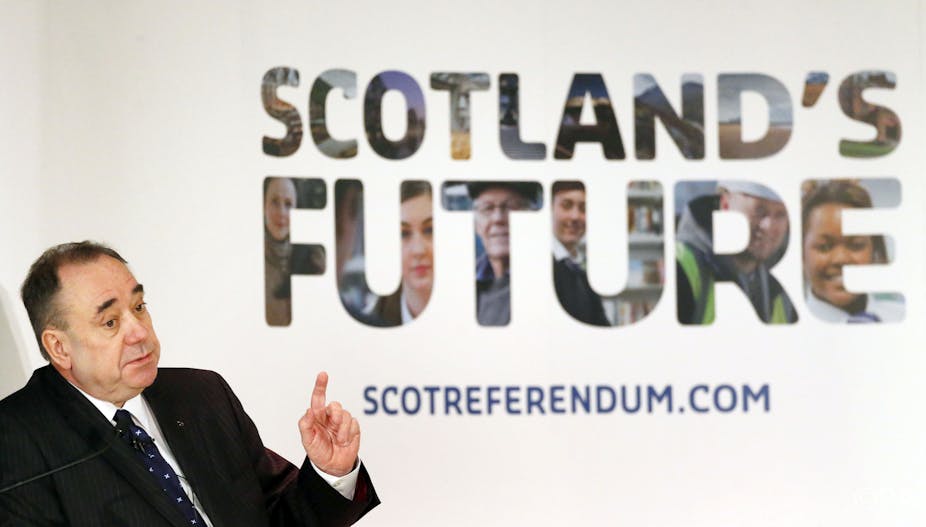Westminster’s Scottish affairs committee has published a report attacking the yes campaign for its approach to pensions and welfare.
The yes campaign responded that its proposals were “affordable” and called on the UK government to come clean on its own pension plans – particularly whether the state pension would rise with inflation. We asked our panel for their reaction.
Jo Armstrong, Professor of Public Policy, University of Glasgow
The Scottish government is projecting total tax revenues by 2016-17 to amount to £64bn, up from £53bn in 2012-13. So to argue that it categorically couldn’t afford its pension plans is hard to justify. But given that Scotland is both currently and projected to run a fiscal deficit, any new commitments will add to this. The key question then is how will it pay for its proposed pension enhancements? What is it not going to do that allows it to fund that commitment, or is it going to have to rely on tax increases and efficiency saving to compensate?
The political choices offered in the white paper are wholly legitimate. The Scottish affairs committee report is robust in the language used to challenge how what is being offered can be paid for. While the white paper offers some views on these costs, it is inevitably based on the Scottish government’s version of the outcome of post-referendum government-to-government negotiations. The final answer on costs will lie somewhere between the two; sometimes closer to one side than the other. What that means for the affordability of the pensions offering is therefore clearly open to question.
One implication of what the Scottish government is saying is that after independence, some of Scotland’s public pension arrangements will continue to be provided by UK. But can we be certain Scotland’s pensioners will get the same terms and conditions as at present, for example? For the SNP to say on key aspects that the outcome will be what they wish it to be begs the question, what happens if these assumptions are wrong?
We are a rich country and currently have lower benefit spend as a proportion of GDP than the UK. But will this be sustainable given declining North Sea output, which greatly inflates Scotland’s post-independence GDP figures?
The Scottish and UK governments are both proposing to accelerate economic and GDP growth. The Scottish government argues this will be done through increased participation, increased productivity, and increased population migration. But how do we raise productivity levels to the rates needed when we have been trying to do so for decades? Growth through net inward migration is also possible, but this has knock-on implications for the costs of health provision, education and housing. These associated costs need to be factored into any assessment of affordability.
With regards to Better Together, they are assuming pessimistic outcomes from the government-to-government negotiations. For example if you take the need to have fully funded pension schemes when Scotland and the rest of the UK split, it seems reasonable to assume an accommodation would be reached, since it would be in both the UK and Scotland’s interests. Businesses do not want to be landed with a bill to fill any funding gap be they based in Edinburgh or London. Going to the EU and seeking some sort of accommodation that allowed a more measured approach to filling any funding gaps seems to be more likely than not.
It is legitimate for the Yes campaign to offer an optimistic view of Scotland after a yes vote. But they also have to make clear what is actually affordable now and what is aspirational and may only be delivered once Scotland has achieved the vaunted step-change in productivity.
It all goes back to goodwill and negotiations, which would happen after the referendum.
Arthur Midwinter, Visiting Professor of Politics, University of Edinburgh
The committee is simply drawing attention to the failure of the Scottish government to produce any costings for the promises that are in the white paper, such as the proposals to increase pension rights compared to the UK or potentially not raising the pension age.
We already spend more per head of the population on pensions and benefits than the rest of the UK, partly because of greater pension credits caused by higher levels of priority. Our income from national insurance contributions is also below the UK average, so we’re talking about higher costs and lower income. Then you’ve got the fact that the age dependency ratio in Scotland is likely to be worse than elsewhere. This is the context of the Scottish government’s proposals.
Now to be fair to the Scottish government, they can’t produce costings for everything because things still need to be negotiated. But in general, I don’t think you should be making pledges in the run-up to the referendum. All the nationalists should really be saying is that if we get control of the levers of power, we will be able to deliver better things, but when you start getting into the detail of uncosted pledges, it’s all wrong. It should simply be about which state you want to live in.
The offers of more devolution from the three main UK parties – we’ll call them devo plus; it would be wrong to call them devo max – these are constitutional issues, so I think it’s OK for them to say where they stand. What they shouldn’t do is make a whole list of pledges on services.
On David Cameron’s recent pledge of £500m for Glasgow, personally I would have waited until after the referendum. You could argue that it was part of a UK package, but anyone in the press would feel that it was part of the push for keeping the union.
Previous panel discussions can be located here.

